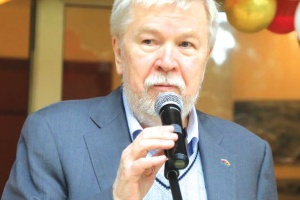BYTEKLEBIRHAN GEBREMICHAEL
Egoism is not necessarily a bad thing. It becomes so only if it manifests itself in its excessive form. In fact, egoism is embedded in nature, in our DNA. Everyone has a self by nature and self- interest is grounded in human nature. Egoism springs from the depths of self –interest driven by forces ranging from the needs for mere survival to those for outstanding success and achievement in life.
But Abebe thought it to be no more than a practical joke when he stuffed his mouth with outsize morsels from a traditional communal lunch tray shared with his two friends, Solomon and Shiferaw, in the Dining Hall at Hailesellassie University in Addis Ababa in the late 1960’s. He always and consistently devoured more than half of the combined three lunch portions allotted to them.
Solomon and Shiferaw could no longer laugh it all off because they always left the Dining Hall only half-satisfied. So, one day, Solomon got rather serious with Abebe and said:
“Abebe, I no longer consider it to be a practical joke. You have overstepped the acceptable norms of decency and table manners. Traditional table manners in communal meals stipulate that your hands should stay close to your part of the communal tray or gebta, that morsels should not bulge your cheeks and that mastication should not make noises. But you have violated all these customs of etiquette and gourmandized more than half of our combined lunch.”
“Well, Selle, what am I supposed to do with a three –part combo? Wait until Shiferaw and you stretch your arms sluggishly and shyly put your hands on the injera on your respective parts of the gebeta, dip injera morsels into the wot and move your hands to your mouth at a snail’s pace? Come on! That’s quite primitive to me. Well, guys there is no time to waste in the space age!”Abebe replied
“Don’t try to be smart, Abebe, gluttony is a cardinal sin! There is obviously a significant difference between a gourmet and a gourmand. I am afraid you are being the latter!” Shiferaw clearly sided with Solomon on the bone of contention.
“I’ll tell you what. We will have our portions on three separate plates instead of all on one tray. Then perhaps you will miss my appetizing gusto and leave your pates half –finished,” Abebe said, as usual never at a loss for answers in defense of his character.
Abebe was an average student lying between C+ and B- but sometimes managed to get A by cribbing Solomon’s or Shiferaw’s answers. Abebe made sure to sit next to either of his friends, particularly at logic and philosophy tests and exams. Believing that the streak of selfishness was a natural part of his intrinsic nature, both Solomon and Shiferaw tolerated his cribbing habit.
One day the philosophy teacher, Prof. Tedla, called Abebe and Solomon to his office and said:
“The probability two answers will be identical to the last word is extremely low, perhaps one in a million. How come your respective answers on self –knowledge, a whole two paragraphs, are perfectly identical. One of you must have cheated.”
“I did, sorry, Professor! I had a terrible headache the night before the exam and I could not read the chapter on epistemology and the philosophy of the mind. So, the only choice I had to protect my ego and the self from the ravages of failure was to resort to cribbing,” Abebe said.
“But that is no way to protect the self. Failure is a fact of life and the self becomes all the more resilient when allowed to confront failure when failure cannot be possibly obviated for one reason or another.
The important thing is to try and know the cause of the failure, which in this particular case is the inability to study the relevant section of your philosophy book. So, in the interests of justice and for your own good, I will reduce your grade A to D. In all fairness, I should cut it to F but I let it stand at D for telling the truth,” the Professor replied.
Solomon felt pity for Abede. He knew that the underlying cause was not the one Abede adduced. Rather, he thought the cause was what he believed to be some sort of congenital egoism? Then, suddenly he thought to himself: “Did I say congenital egoism. Is egoism congenital? Is it an outcome of some sort of a hormonal or a biochemical dysfunction in the body or brain?”
Solomon mulled the issue for a good portion of his slumber time and finally decided to make it a topic of discussion in his philosophy class the next morning and gradually went to sleep.
“Good morning, class. We shall continue our discussion on epistemology and the philosophy of the mind we started the day before yesterday,” Prof. Tedla said, getting ready for his regular lecture.
Solomon raised his hand and Professor Tedla signaled him to speak. “Prof. what is the cause of egoism and how can it be corrected?” Solomon asked.
Does anybody want to volunteer to answer the question? Prof. Tedla said.
Shiferaw did so and said: “In brief, ego is the self –image of the self.”
“Good answer, but egoism has had a bad press as being a negative thing in and of itself. In what sense ? the Professor asked.
Solomon was next to speak and he said:
“Ego is usually looked upon as negative in every day parlance. It is actually inextricably intertwined with the self which, of course, is the core of ones identity; the ‘ism’ added to it makes it sound even more negative by associating it closely with selfishness, which has always been regarded as a bad human trait.
It took the genius of Ayan Rand (‘The Virtue of Selfishness’) to debunk the undeserved opprobrium and stigma attached to and associated with the term and the mental and emotional constructs it conjured (and still conjures) up. At any rate, it is the excess of egoism that should be condemned and not its existence and manifestations.”
“I could not explain it any better. Well said, Solomon! By the way, class, that’s precisely why Solomon and Shiferaw have been straight A students throughout their stay at the University.
The trick to master philosophy is to dare to think deeply almost until it hurts. After all that is why Thomas Edison long ago said, “Genius is one percent inspiration and ninety –nine percent perspiration,” the Professor remarked.
Solomon and Shiferaw were obviously elated, but apish and uppish Abebe was not going to take this lying down. So, he said:
“But Professor, isn’t it true that one has to think and feel big in order to be able to achieve great things. In other words, isn’t a great, outsize ego necessary to be a great leader, a great philosopher and a great business person?”
“The problem with that hypothesis is that if you already have a massive ego before you have even mastered epistemology, then the tendency for you would be to demand to be a straight A student in philosophy and when reality denies you that status, to try to cheat to obtain it. That clearly is not a good thing in life,” the Professor responded.
“But, Professor, how can I become the prime minister of Ethiopia if I do not have an Everest- size ego and eliminate all my competitors?” Abebe asked.
“Eliminate them by force? That indeed is a good sign of a dangerous outsize ego,” the Professor answered.
Shiferaw made a brilliant intervention which the Professor himself vouched for. He said: “There is nothing we can do about the existence of ego. It is nature and a core part of the self. What is bad is an outsize ego that is visibly out of sync with its real and tangible achievement A sergeant who grabs political power by force and wants to stay there for the rest of his life has a destructive outsize ego.
So, I think we need to make a distinction between an aspiring or eager ego and one that is just greedy, grasping and pompous. An aspiring or eager ego works hard to achieve its aspiration. In that case, the ego realizes its aspiration and there is no gap between the ego and its achievement.
We cannot thus speak of an outsize ego here. On the other hand, a greedy, grasping ego does not work hard to match itself, which means there is a gaping hiatus between it and its achievement. This is what I call a dangerous outsize ego.”
“Excellent thinking, Shiferw! I vouch that you can be an excellent anybody and not just an excellent philosopher! To expand on what Shiferaw said, when ego equals achievement there is no ego but self. There is no egoism or selfishness in their negative sense but self- actualization and self- fulfillment.
Therefore, our task now would be to measure the value of the achievement and reward the achieving ego accordingly. Would anybody suggest how?,” the Professor said with great happiness and joy at Shiferaw’s remarkable intervention.
Almost as expected, Solomon began to speak and everybody was listening attentively. He said:
“What are the major aspirations of the ego or self ? I believe they are wealth, power, prestige and love. Wealth can be created by producing goods and services and selling them at prices in competitive markets; political power can be obtained by competing in free and fair elections; love is a coincidence of mutual true love; and prestige a combination of all these factors which deservedly go into the satisfaction of one’s ego. Here ego is equal to the achievement of the aspirations of the ego and therefore there is no excess ego or egoism over and above the realization of its aspirations.”
“Wonderful!” the Professor said and he was about to comment on Solomon’s insightful observation when Abebe butted in and said: “I did not deserve the excess morsels of the injera and wot I bulged my cheeks with; nor did I the occasional A’s I got in philosophy; They were all undeserved realizations of the aspirations of my outsize ego or excessive egoism.”
The Ethiopian Herald March 25/2021




